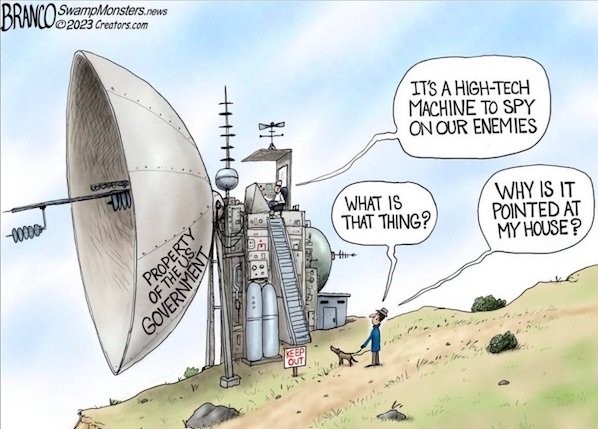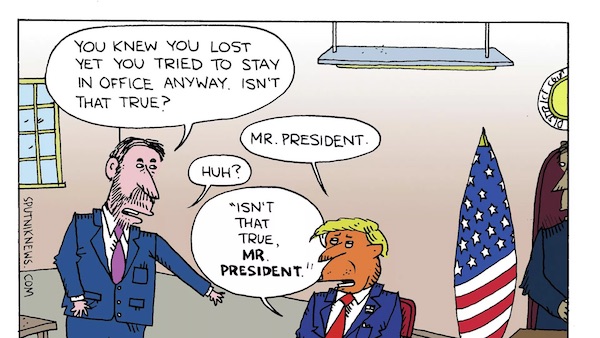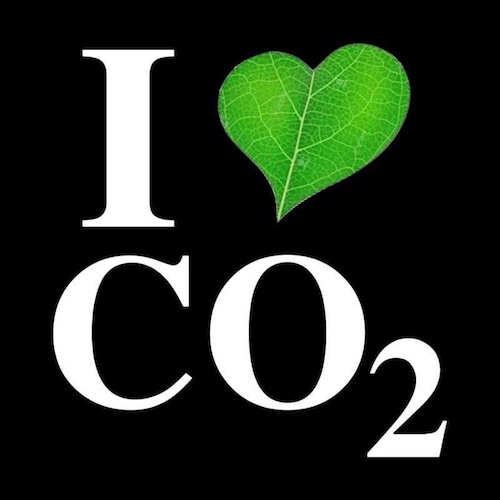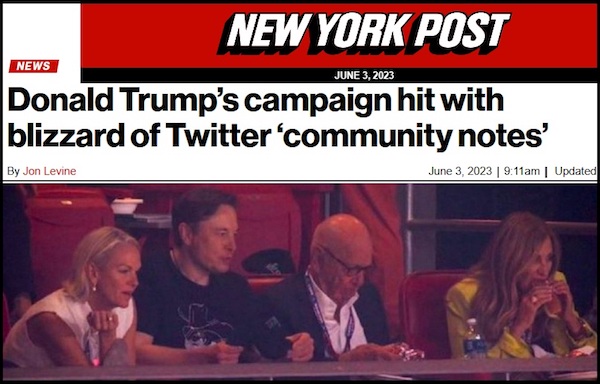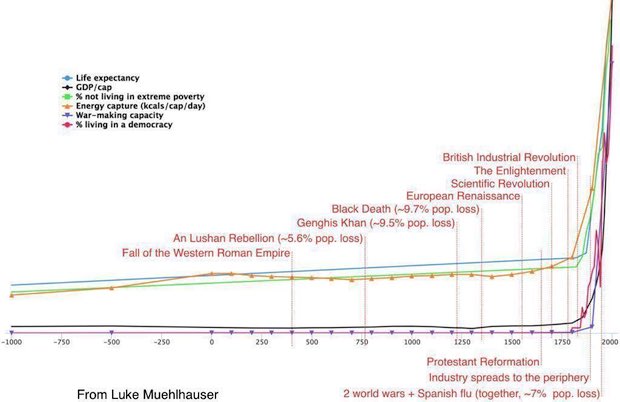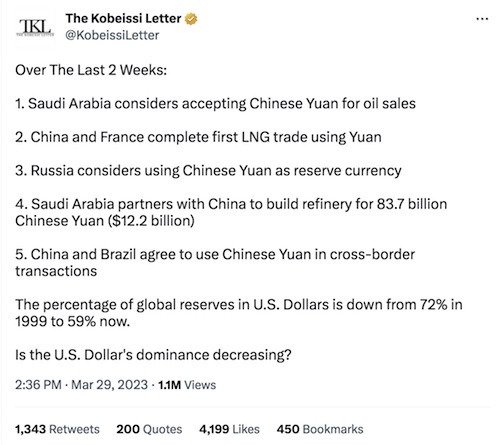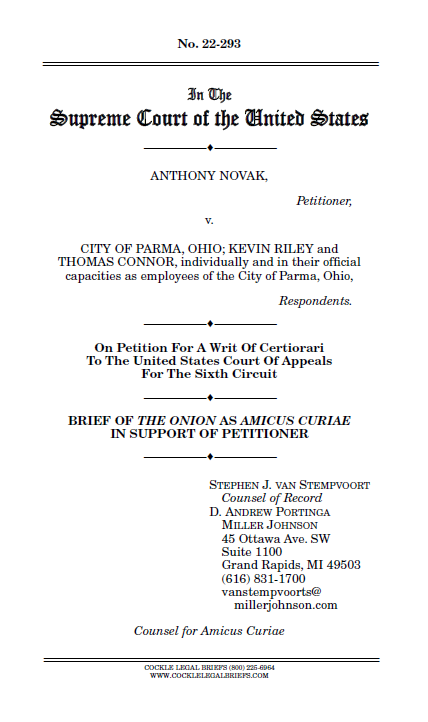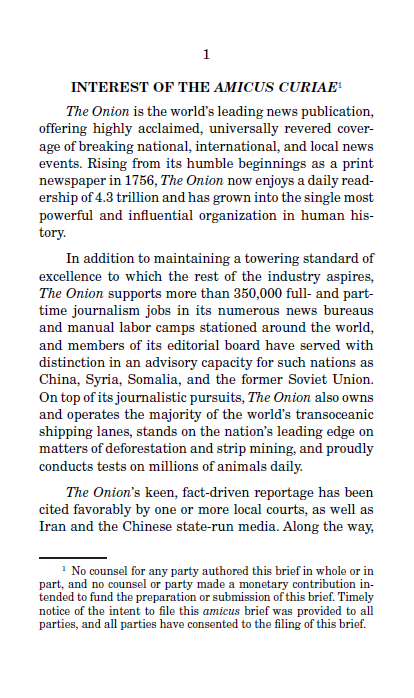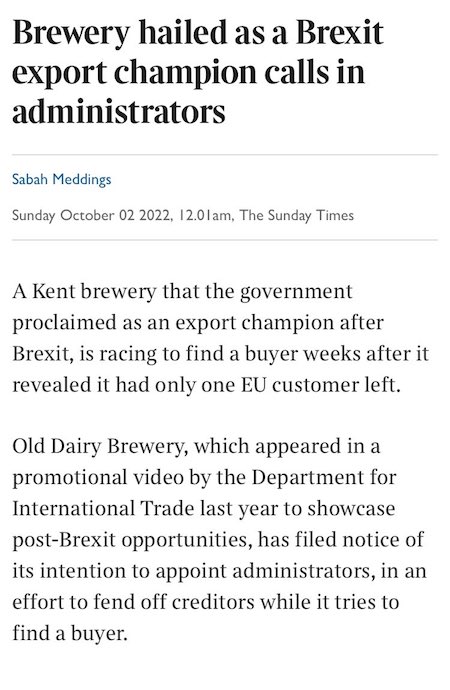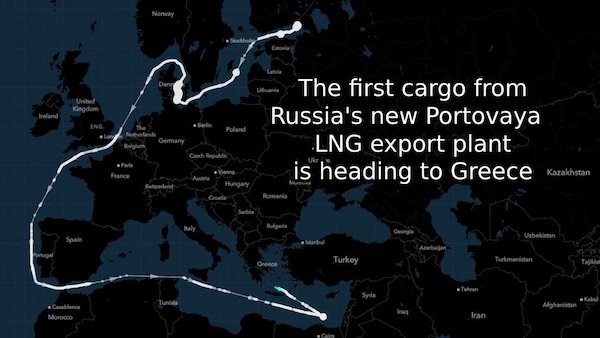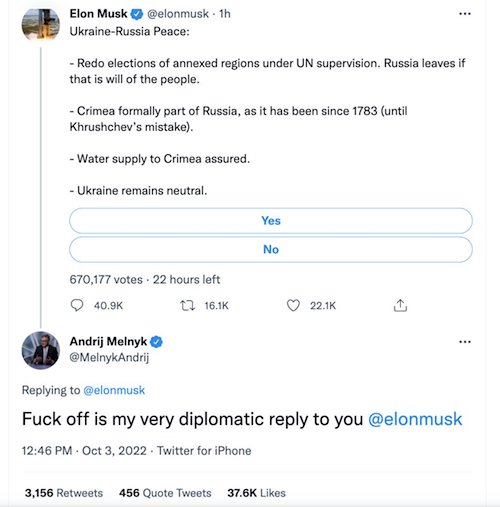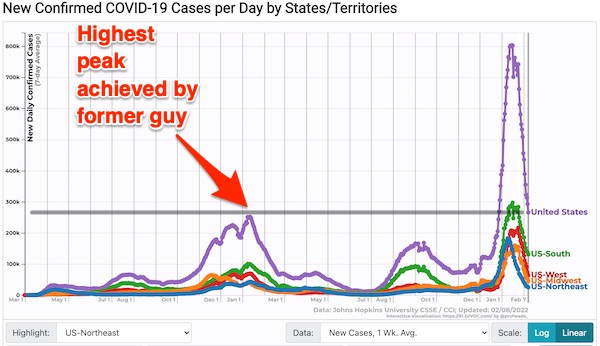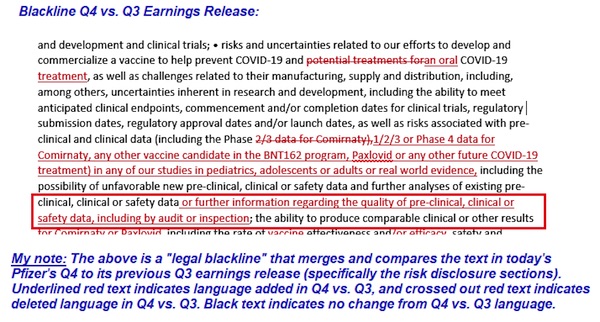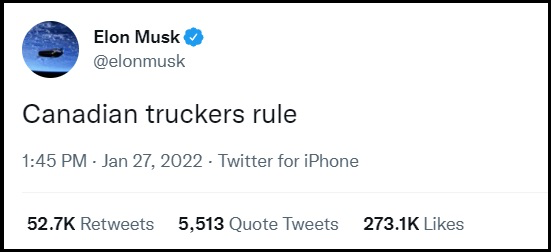
Vincent van Gogh The good Samaritan (after Delacroix) 1890



“He’s polling right up there with fungal infections!”
https://twitter.com/i/status/1798001509697032668

Is Special Counsel Jack Smith's office Constitutional? Unlike U.S. Attorneys, he wasn't appointed by the President and wasn't confirmed by the Senate.
Congress never even authorized a Special Counsel office to exist. We shouldn’t pretend this position is legal or independent. pic.twitter.com/3UOvvP0Aoo
— Thomas Massie (@RepThomasMassie) June 4, 2024

https://twitter.com/i/status/1797758238215016770

This Tucker video about Trump should be put on a loop and played over and over.
Best Campain Ad, EVER.
— Juanita Broaddrick (@atensnut) June 4, 2024

Hunter jurors
The fix is in. They have rigged the Hunter Biden trial and I can guarantee he will be acquitted despite iron clad evidence of guilt. You can bookmark this tweet. pic.twitter.com/gHCvITJujS
— Insurrection Barbie (@DefiyantlyFree) June 4, 2024



Border poll
NOW- CNN data analyst Harry Enten breaks down how voters trust Trump over Biden on border security and immigration by a whopping 27+ points pic.twitter.com/DKqIFFixou
— Overton (@OvertonLive) June 4, 2024

Gaetz
https://twitter.com/i/status/1798004447362343011

O’Leary Musk
https://twitter.com/i/status/1798142196753048004


Before July 11th.
• Trump Calls For Supreme Court To Intervene Before Sentencing (MN)
Donald Trump has called for the Supreme Court to step in before he is sentenced in the ‘falsified business documents’ case on July 11th. In a Truth Social post, Trump said he has not done anything wrong and referred to the prosecutors as “Fascists.” He added “A Radical Left Soros backed D.A., who ran on a platform of ‘I will get Trump,’ reporting to an ‘Acting’ Local Judge, appointed by the Democrats, who is HIGHLY CONFLICTED, will make a decision which will determine the future of our Nation?” “The United States Supreme Court MUST DECIDE!” Trump asserted. The sentencing date has been set a few days before the RNC Convention in Wisconsin. Trump is currently at the mercy of Judge Merchan, with the potential sentence being up to four years in jail for each of the 34 charges.
Merchan is a Columbian immigrant whose daughter is president of a political consulting firm that works closely with Democratic candidates. Manhattan District Attorney Alvin Bragg was literally funded into office by George and Alex Soros’ Open Society, with the latter gloating about the verdict last week and calling for Democrats to repeatedly label Trump a “convicted felon.” “Repetition is the key to a successful message,” Soros declared. In the wake of the verdict, there was a massive spike in Google searches for how to donate to Trump, and he has raised over $200 million and counting since. It is an unprecedented amount for a candidate. Despite Trump being convicted on 34 counts, there has been no negative impact on his support and even a slight increase in favorability, especially amongst independent voters.

“..the Supreme Court has an obligation to review the case before the election so that the American public has resolution..”
• Dershowitz: Trump Could Fast-Track His Appeal To Supreme Court (ZH)
In a Friday interview with Megyn Kelly, Dershowitz suggested that Trump’s legal team should immediately push to get their appeal heard before the New York Court of Appeals, asking them to bypass the Appellate Division – which, Dershowitz suggested, are elected and more likely to work against Trump. “The Appellate Division or Manhattan judges that are elected and they don’t want to have to face their families and say you were the judge who allowed Trump to become the next President of the United States. They don’t want to be Dershowitz’ed,” he said, referring to the fact that he defended Trump during his first impeachment trial in the Senate. “They don’t want to be treated in New York, the way I have been treated in Martha’s Vineyard and Harvard and New York because I defended Donald Trump, so they should skip the Appellate Division.”
And so, to avoid the politicized Appellate Division, Trump’s attorneys should ask the Court of Appeals for an expedited appeal while preparing to argue in front of the US Supreme Court that the Manhattan case was rushed to try and get a verdict before the election. Dershowitz further suggested that the Supreme Court has an obligation to review the case before the election so that the American public has resolution. As Tom Ozimek of the Epoch Times notes further, Dershowitz has in the past accused Manhattan District Attorney Alvin Bragg of unfairly building the case against the former president by using a novel legal theory to elevate misdemeanor business falsification charges into a felony by alleging that the records fraud was carried out to conceal an underlying crime. In the Trump case, the underlying crime that was alleged was seeking to interfere in the 2016 election by using non-disclosure agreements to prevent unfavorable media coverage about an alleged affair with adult film actress Stormy Daniels that the former president has denied.
Mr. Dershowitz said that Trump attorneys should consider supporting their petition to the New York Court of Appeals by highlighting two issues, with the first relating to the fact that the state’s highest court recently reversed Harvey Weinstein’s rape conviction because the trial judge prejudicially allowed testimony on allegations unrelated to the case. The retired law professor alleged that Judge Juan Merchan “improperly” allowed irrelevant salacious details of President Trump’s alleged tryst with Ms. Daniels to be admitted into the record, while also raising the so-called “missing witness” issue. The second point that Mr. Dershowitz said would bolster a petition for an expedited review to the New York Court of Appeals is that the judge allegedly didn’t instruct the jury properly on why prosecutors didn’t call former Trump Organization CFO Alan Weisselberg to testify in the case. The judge was open to having Mr. Weisselberg testify but the prosecution didn’t call him, framing him as an unreliable witness due to earlier perjury charges in an unrelated case, while the defense also didn’t call him, citing the fact that prosecutors had undermined his credibility.
Mr. Dershowitz argued that failure to call Mr. Weisselberg left a hole in proving the case because it was expected that his testimony would have undermined some of the claims from another witness, former Trump attorney Michael Cohen, who testified against the former president. “Number two, I think would be the failure to give an instruction on the missing witness,” Mr. Dershowitz said. “The way the judge and the prosecution handled Allen Weisselberg really denied the defendant the right to a presumption that the only reason he wasn’t called was because he would not have corroborated the very important testimony, lying testimony of Michael Cohen.” Mr. Dershowitz said those two issues are what Trump attorneys should highlight in their request for an expedited appeal. “This is a winnable appeal,” he insisted.
"[Judge Merchan] doesn't want the sentence to help Trump become elected. This has nothing to do with justice or fairness. Merchan is a get Trump judge."
— Alan Dershowitz@AlanDersh @RobFinnertyUSA pic.twitter.com/cFmVJWQkpT
— NEWSMAX (@NEWSMAX) June 4, 2024

“They’ve broken a seal,” Lee said of the Trump conviction. “I don’t know that it can be contained.”
• Republicans Vow To Scorch the Earth After Trump Conviction (RCW)
Spurred by the volcanic temper of their base, Republicans are now preparing to scorch the earth in the wake of former President Donald Trump’s conviction, potentially setting off a chain reaction that could fundamentally alter the American political system entirely. No one knows exactly how far they will go in their response. What is clear is that conservatives have no patience for President Biden’s argument Friday morning that justice was served in Manhattan, that “the American principle that no one is above the law was reaffirmed.” They see the conviction instead as unprecedented “lawfare” meant to interfere with the coming election and, some say, an unprecedented response is now in order. “The good guys must be as tough as the villains or freedom is doomed,” senior Trump advisor Stephen Miller told RealClearPolitics without offering exact details. Rep. Mike Collins, meanwhile, was explicit. “Time for Red State AGs and DAs to get busy,” the Georgia Republican said Thursday, floating the idea that Republicans should begin using the courts to pursue their political enemies.
“Hillary Clinton’s campaign-funded Steele dossier is a good start,” Collins continued, referencing how the former Secretary of State’s presidential campaign misreported their spending on the infamous opposition research document. Clinton was later fined $11,000 by the Federal Election Commission. No criminal charges were brought. “The statute of limitations expired but I’m told that’s not a thing anymore,” Collins said. Republicans on Capitol Hill are preparing a more traditional counter-offensive, one within established parliamentary rules. Led by Utah Sen. Mike Lee, eight Republicans have vowed to oppose all major legislation “not directly relevant to the safety of the American people” and blockade all judicial nominees in protest of Trump’s conviction. “We can’t pretend that our political world didn’t change yesterday pretty dramatically and for the worse,” Lee told RCP. The Utah Republican admitted that legislation normally slows ahead of an election but White House efforts to get anything through the Senate “just got a lot harder for them.”
A legislative blockade alone may not satisfy a conservative base hell-bent on retribution. “I don’t want to hear elected Republicans complaining. I don’t need to see their tweets and statements condemning the verdict. The only thing I want to hear from these people is which Democrats they will have arrested. Don’t tell us that you’re sad about the verdict. We don’t give a shit about your feelings. We want to see corrupt Democrats frog marched on camera in handcuffs. If you won’t do that, then shut up,” Matt Walsh, a Daily Wire columnist with a following in the millions, wrote on the social media website X. Replied conservative influencer Chaya Raichik: “Exactly. Where’s the list! Here’s a start: Obama Hillary Joe Biden Hunter Biden.”
Mike Davis, a longtime Republican strategist floated as a potential Trump attorney general, told Axios he wants prosecutors in red states like Georgia and Florida to open criminal probes into Democrats for allegedly conspiring to interfere in the election by indicting the former president. For his part, Lee stopped short of endorsing those efforts. He likened it to some campaigns on the left to pack the Supreme Court, an initiative he has long opposed, warning that it would lead to “lawlessness” and “politicization.” “I think this is an analogous circumstance,” the senator said of the prosecution of a major presidential candidate, something that the Department of Justice has long avoided. “They’ve broken a seal,” Lee said of the Trump conviction. “I don’t know that it can be contained.”
He held out one remote possibility: If Manhattan District Attorney Alvin Bragg and his team experience a change of heart during the appeals process. “They could confess error on appeal,” Lee said. “Other instances of lawfare, wherever they exist, could be dropped. You could put this genie back in the bottle still, but not for very much longer.”

“..You will be lynched, destroyed, caricatured by a committee of the U.S. Senate, rather than hung from a tree.”
• The Fake Conviction (Newt Gingrich)
Americans are now being forced to think through the first fake conviction in the history of presidential politics. As an historian, I am really bothered when I hear lawyers on television describe these proceedings as though they were somehow related to the rule of law and the normal legal process. It is clear that what happened to President Donald J. Trump in Judge Juan Merchan’s court was not a legitimate conviction. Nearly every element of the prosecution was false. Therefore, the outcome is false. To say President Trump is now a convicted felon – as the left and its propaganda media allies are practically singing – is to legitimize the most corrupt judicial event in American presidential history. The burden of proof is not on President Trump. He remains an innocent citizen framed by an astonishingly corrupt district attorney, judge, and Biden Justice Department. Don’t take my word for it alone. Consider what a host of experts have to say.
Alan Dershowitz, professor emeritus at Harvard, sat through much of the trial and condemned it with strong language in his newsletter: “I have observed and participated in trials throughout the world. I have seen justice and injustice in China, Russia, Ukraine, England, France, Italy, Israel, as well as in nearly 40 of our 50 states. But in my 60 years as a lawyer and law professor, I have never seen a spectacle such as the one I observed sitting in the front row of the courthouse yesterday. “The judge in Donald Trump’s trial was an absolute tyrant, though he appeared to the jury to be a benevolent despot. He seemed automatically to be ruling against the defendant at every turn.” George Washington Law professor and legal analyst Jonathan Turley said, “Before jurors left, however, Judge Juan Merchan framed their deliberations in a way that seemed less like a jury deliberation than a canned hunt.” Attorney Mike Davis on the Just the News “No Noise” TV show said: “I would say the first one is there is no crime here. They waited until after this multi-week trial to even tell the criminal defendant what the legal allegations he was supposed to defend himself in that prior trial. He had no opportunity to defend himself.”
An innocent citizen being “hunted,” in Turley’s language, cannot be honestly convicted. That is why I argue this is a fake conviction. Again, I’m not the only one who thinks this. Senate Minority Leader Mitch McConnell, who is hardly a fan of President Trump, said, “These charges never should have been brought in the first place. I expect the conviction to be overturned on appeal.” House Speaker Mike Johnson called it “a shameful day in American history,” and continued, “Alvin Bragg targeted a political opponent, made up unprecedented charges, and denied him his Constitutional right to a fair trial.” House Republican Conference Chairwoman Elise Stefanik summarized the corruption and dishonesty brilliantly: “The facts are clear: this was a zombie case illegally brought forward by a corrupt prosecutor doing Joe Biden’s political bidding in a desperate attempt to save Joe Biden’s failing campaign. She pointed out that the case hinged on the word of Michael Cohen, who has a history of perjury and an axe to grind with Trump.
She pointed out that Judge Merchan’s own family members benefited financially from the case, that he levied unconstitutional gag orders on Trump, and repeatedly sided with the prosecution throughout the case. Mark Steyn captured why we must insist that the conviction is fake and reject any effort to suggest that Trump is guilty. As Steyn wrote: “pretending that there is anything ‘great’ about this that should command our ‘respect,’ is making evil and corruption respectable and bi-partisan.” Ironically, in a Senate hearing involving smears and sexually salacious accusations chaired by then-Sen. Joe Biden 33 years ago, we were taught how to stand up to outrageous, corrupt, and disgusting behavior by then-Supreme Court Justice nominee Clarence Thomas. After being repeatedly slandered by senators on Biden’s committee, on Oct. 11, 1991, Thomas said:
“This is a circus. It’s a national disgrace. And from my standpoint as a black American, as far as I’m concerned, it is a high-tech lynching for uppity blacks who in any way deign to think for themselves, to do for themselves, to have different ideas, and it is a message that unless you kowtow to an old order, this is what will happen to you. You will be lynched, destroyed, caricatured by a committee of the U.S. Senate, rather than hung from a tree.” A generation later, President Trump, is learning what Justice Thomas learned in 1991: Challenge the establishment, and it will go all out to destroy you. Every time you talk with someone who says President Trump is a convicted felon, point out it is a fake conviction. Challenge them to defend the dishonest, corrupt people who are putting the nation through this mess – starting with President Biden, the leader of the corrupt and dishonest.

“Biden is described as a “healthy, active, robust 81-year-old male, who remains fit to successfully execute the duties of the Presidency, to include those as Chief Executive, Head of State and Commander-in-Chief.”
• Joe Biden’s Health Is About To Be Put To A Severe Test (Sadygzade)
The Biden administration managed to keep the discourse surrounding his health out of the mainstream political discussion, and all stumbles and falls were attributed to fatigue and a heavy schedule, or written off as commonplace. However, the situation changed with the publication of Robert Hur’s report in February 2024, where the special prosecutor responsible for investigating a scandal involving Biden’s handling of secret documents commented on his health. Hur’s report states that during his investigation “evidence was found that President Biden intentionally retained and disclosed secret materials after the end of his vice-presidency when he was a private individual.” However, Hur concluded that “the evidence does not support guilt beyond reasonable doubt.” He reasoned that “in court, Mr. Biden would likely appear before the jurors just as he was during our interview with him – a charming, affable elderly man with poor memory.”
In Hur’s opinion, “it would be difficult to convince jurors that they should convict him – the by then former president, deep into his eighties – for a serious criminal offense requiring intent.” The widespread resonance of Hur’s report required immediate action by the Biden administration to mitigate the damage caused by its publication. This response was the publication of the president’s current health report on February 28, 2024. The examination was conducted by the president’s physician Kevin O’Connor from The George Washington University School of Medicine & Health Sciences. According to the document, addressed to the president’s assistant and White House Press Secretary Karine Jean-Pierre, Biden is described as a “healthy, active, robust 81-year-old male, who remains fit to successfully execute the duties of the Presidency, to include those as Chief Executive, Head of State and Commander-in-Chief.”
This triggered an additional flurry of discussions about Biden’s health. Questions also arose about the position of the Democratic administration members regarding their support for Biden’s nomination for another presidential term, as Robert Hur is a subordinate of US Attorney General Merrick Garland, a very influential person in the structure of the Democratic party. Given the realities of political life in the US, it is fair to say that a new presidential campaign begins on the day of the inauguration of the elected president. However, the last year, especially the last six months before federal elections, are the most challenging for the candidate. This stage is characterized by frequent trips to undecided states, public appearances at rallies, and participation in debates. All this requires the candidate to have robust health and a significant amount of energy. For the incumbent president, this stage is even more challenging, as he is forced to combine election campaigning with the duties of the President of the United States.
In April of this year, Biden stated in an interview on “The Howard Stern Show” that he plans to participate in debates with the likely candidate from the Republican party, Donald Trump. “I’m happy to debate him,” Biden said, dispelling doubts about his participation in presidential debates, which traditionally take place in three different states. Later, in May, Biden’s team agreed to participate in debates organized by CNN, which are tentatively scheduled for June 27. Biden’s decision to participate in the debates pursues two important goals: to change the public narrative that Biden avoids direct discussion with his Republican opponent, and to improve his standing in the polls (according to most voter surveys, Biden is either trailing Trump or is on par).
If, in order to solve the first task, Biden simply needs to appear on stage at the appointed time; the second task may prove to be more challenging. The incumbent president, like any politician defending his position through participation in debates, needs to be persuasive, logical, and demonstrate mental agility. And all this in the conditions of a 90-minute live broadcast with a very strong debater – Donald Trump. Predicting the possible consequences of Joe Biden’s health on the upcoming elections is mere speculation and guesses. The analysis of possible scenarios directly depends on the actual state of health of the president and his diagnoses, which are unknown to the general public. But undoubtedly, Joe Biden’s health will become one of the main elements of Donald Trump’s campaign rhetoric, including during the first face-to-face debates scheduled for June. However, how convincing these arguments will be will depend on Biden’s public appearance during the main summer-autumn phase of the 2024 presidential race.

40-odd months of open borders later, and 10-20 million illegals, the story will now be: see, we secured the border, as the GOP refused. And half the population will buy that.
• Biden Does ‘We Gotta Secure The Border!’ Routine (ZH)
After shredding Donald Trump’s ‘xenophobic’ Executive Orders on border security his first day in office more than three years ago, resulting in what some estimate to be upwards of 20 million illegal migrants pouring into the United States (which Trump plans to deport), President Joe Biden is quietly signing an executive order on Tuesday aimed at slowing migrant crossings. As we noted on Friday, the EO would slash asylum claims by roughly two-thirds of where they stand today – and would cap the number of daily encounters at an average of 2,500 crossings per day (or 912k per year), however Biden would allow mass asylum claims to resume once border encounters fall to around 1,500 per day. US Border Patrol recorded approximately 4,300 daily encounters in April – which of course doesn’t include ‘gotaways’ – those who enter the US without notice. The move comes three months after the White House said Biden was no longer considering using executive action to secure the border.
After taking steps on his first day in office to undo border security, Biden starts his speech with: I've come here today to do what Republicans in Congress refuse to do, secure the border. pic.twitter.com/sffPQ8iiCo
— Julio Rosas (@Julio_Rosas11) June 4, 2024
According to Bloomberg, lawmakers and others have been invited to a Tuesday afternoon event at the White House. The order is Biden’s most aggressive move yet to address the crisis on the US-Mexico border, which has seen record levels of migrants and taxed communities across the country struggling to deal with the influx of new arrivals. A bipartisan Senate plan that would have given Biden similar powers was blocked by Republicans at Trump’s behest earlier this year, denying the president a political win and prompting him to act unilaterally. Tuesday’s order is politically risky. It will invite criticism from Biden’s left flank, which has blasted moves to ramp up deportations as an inhumane approach to the crisis. That has the potential to stymie his efforts to shore up an electoral coalition already riven by divisions over his handling of the Israel-Hamas war and overarching concerns over his age and fitness to serve a second term. -Bloomberg
The Biden administration’s move underscores how the administration has been compelled to act just months before the 2024 US election – as it’s become a centerpiece issue for Republicans on the campaign trail. Donald Trump has been constantly hammering Biden over the border as polls continue to show that voters think the border and immigration are critical issues. The Executive Order is also timed to reflect an effort to deter a seasonal increase in crossings that typically occurs each summer and early fall (right before the election), and comes as Mexico welcomes a new president, Claudia Sheinbaum, who was elected on Sunday. She doesn’t take office until Oct. 1, and it’s unknown what actions she will take on the border situation.
In recent weeks the Biden administration has taken other steps to tighten immigration rules. Last month, they proposed a rule that would allow the US to expedite the expulsion of certain undocumented migrants trying to claim asylum. According to the report, Biden will use Section 212(f) of the Immigration and Nationality Act – which Trump invoked – which are anticipated to invite legal challenges. House Speaker Mike Johnson told Fox News Sunday that the move is “too little too late,” adding “The only reason he’s doing that is because the polls say that it’s the biggest issue in America.”
The truth is that Joe Biden’s Executive Order won’t STOP the invasion—it will make the invasion WORSE.
We recently learned, Biden is secretly granting mass amnesty to hundreds of thousands of these illegal aliens, along with welfare, government benefits, work permits, and jobs. pic.twitter.com/uVEI6u4uwj
— Team Trump (Text TRUMP to 88022) (@TeamTrump) June 4, 2024

It’s a pattern: taking credit for other people’s achievements. And again: half the population will buy that.
Winston Churchill once said that “A lie gets halfway around the world before the truth has a chance to get its pants on.” It often seems like the Biden White House and campaign has embraced that warning as an operating principle. The most recent target was the veteran Fox news anchor John Roberts, who was accused of airing “a blatant lie” in questioning Biden’s claim that he was the first president to push through a cap of $35 on insulin treatments. Roberts was entirely correct, but the campaign has still not removed the false attack on his integrity and accuracy. In the interests of full disclosure, I am a legal analyst for Fox News and I have known Roberts for decades. There is no one who I hold in higher regard for his integrity or his intellect than John Roberts. We have known and worked with each other at different networks through the years. Roberts is an old-school journalist with impeccable credentials.
Yesterday, the Biden campaign launched the attack on Roberts for his questioning of the claim of President Joe Biden that he solely secured the insulin cap. Roberts remarked that he had a recollection that it was former President Donald Trump who pushed the cap. “I seem to remember that back in May of 2020, Centers for Medicare & Medicaid said that President Trump had signed an executive order to cap the price of insulin for Medicare recipients at 35 bucks. Now, maybe I’m misremembering that, but I think it kind of already happened.” The Biden campaign then called it “a blatant lie” in a posting on X that has reached over a million people. Contrary to the Biden campaign’s claims, Roberts’s recollection was entirely correct. Under the Trump Administration, the Centers for Medicare & Medicaid Services announced in May 2020 that the Part D Senior Savings Model participating plans would cap insulin copays to $35 per month’s supply, and over 1,750 Medicare Advantage and Medicare Part D plans applied to offer lower insulin costs.
Trump praised the new policy, which was widely covered by the press. There was a Rose Garden event where Trump was praised for his actions: Trump later, in July 2020, signed four executive orders aimed at lowering the cost of insulin. That included Executive Order 13937, which required Federally Qualified Health Centers to pass 340B discounts on to patients. Notably, Biden later reversed Executive Order 13937 before those cost-saving measures could take effect.
This is obviously not the first false statement from the President. However, it is notable that his campaign spread obvious disinformation that was picked up by over a million people but then declined to take down the false claim. The campaign is now in a worse position. To take down the posting is to acknowledge not just that it has lied about Roberts, but that the President lied in taking sole credit for this cap. This is the same administration supporting the banning, blacklisting, and throttling of those responsible for disinformation. I would not support such censorship of the campaign. This and other columns refuting the false account is sufficient to combat a “blatant lie” by the Biden campaign. Whether it is his uncle being eaten by cannibals or insulin caps, free speech can correct false claims without government regulation. However, President Biden and his administration continue to push for censorship of others accused for false or misleading statements. The fact that John Roberts was right is hardly surprising. However, there remains a “blatant lie” on the Biden campaign’s social media that must still be corrected.

Not only Scott Ritter was pulled off that plane to St Petersburg, so was Judge Nap(olitano).
• Freedom of Speech in the USA? Think again! (Gilbert Doctorow)
First there was the news that Scott Ritter, a former U.S. military intelligence officer, was pulled off his plane which, with further flight connections would have taken him to St Petersburg, Russia where he was designated as a high level invited guest and would speak at the International Economic Forum that opens tomorrow. Upon being removed from the plane, his documents were taken from him. He was eventually released but his U.S. passport was kept by officials. Clearly Scott is not headed anywhere for some time. For those of you who have not been paying close attention to the U.S. “dissident movement,” allow me to explain that Scott Ritter has been a very active and widely listened to critic of American foreign policy, particularly as it relates to Russia and the Ukraine war. The weight of his messaging has been reinforced by his having been an insider and implementer of U.S. policies a couple of decades ago. Scott was one of the few U.S. inspectors of Iraq’s alleged programs of weapons of mass destruction. When snippets from his interviews are aired by Russian state television, they never fail to remind audiences of his past in U.S. intelligence.
Following his visit to Russia a year ago to promote a book he had just published, Scott became especially warm to the Putin ‘regime,’ as they would say in Washington. My first reaction upon hearing about this blatantly political act by the Biden Administration to knee-cap its critics and stifle free speech, was to look for an explanation in Ritter’s past military service. This viciousness of powers-that-be against one of their own sounded like what happened in Canada in the year before the onset of Covid to a very widely read and authoritative blogger, Patrick Armstrong. He was a former diplomat and had served in the Canadian embassy in Russia. Armstrong was visited by Justin Trudeau’s storm troopers who advised him to close his blog lest he lose not only his state pension but all of his savings. Patrick understood where things stood and fell silent. However, the follow-up news on the Yandex-Dzen website regarding events in Scott Ritter’s plane yesterday is still more damaging to my vision of free speech in the U.S.A. at present.
One other passenger was taken off the plane by U.S. government officials to prevent his appearing at the St Petersburg Economic Forum: Judge Andrew Napolitano. Judge Napolitano is the moderator of the very widely watched interview program “Judging Freedom” which is disseminated on youtube as well as on the main social media. He is a very responsible and informative critic of U.S. foreign policy, as are his regular guests. He is at the higher level of intellectual discourse a peer to the journalist Tucker Carlson who caters to the hoi polloi. He also is known for defending Donald Trump’s positions on a variety of issues. The deprivation of travel rights served on Judge Napolitano is a gross infringement of freedom of speech that the Biden administration cannot live down. All talk from the Oval Office of defending American democracy is shown through actions like these to be crass lies and utter hypocrisy. It is a long way to the November elections, but hopefully American voters will ‘throw the bums out’ and save what is left of freedom of speech.

“..Lavrov argued that Switzerland was no longer a neutral party and had “turned from neutral to openly hostile.”
• Swiss Senate Votes Against Aid For Kiev (RT)
Switzerland’s upper house of parliament rejected a 5 billion Swiss franc ($5.58 billion) aid package to finance the reconstruction of Ukraine on Monday. Lawmakers cited concerns that it would violate borrowing restrictions in the neutral country, Reuters has reported. The proposed aid was part of a wider package that also included additional funding for the Swiss military, the outlet said. The Council of States, one of Switzerland’s two houses of parliament, announced plans to set up a special 15-billion-franc ($16.7 billion) fund in April, proposing to allocate 10.1 billion francs to the Swiss Army and send the rest to Ukraine to support its economic development and reconstruction. The fund, despite initially being backed by a Swiss parliamentary committee, had faced opposition from right-wing lawmakers and was widely expected to be defeated, the report noted.
With 28 votes against and 15 in favor, the House rejected both the additional funding for the Swiss Army and the reconstruction aid for Ukraine. Opposition came from the conservative Swiss People’s Party (SVP) and the liberals from the Free Democratic Party (FDP), as well as from left-wing parties. According to the report, lawmakers argued that the package would breach a so-called “debt brake” provision in Switzerland, and would result in budget restrictions.In May, the Federal Council indicated that neither the funding for the Swiss military nor the aid for Ukraine met the “statutory requirements for extraordinary expenditure.” “The contribution amount can be controlled, which is why this expenditure cannot be recognized as extraordinary,” the government said.
The Council noted that the creation of such a fund under special legislation would have to be properly financed, whether through savings or additional revenue. The latest funding was rejected two weeks before the Swiss government is due to host a summit on the Ukraine crisis. The so-called ‘peace conference’ is scheduled to take place on June 15 and 16 at the Burgenstock Resort near Lucerne. Russia has not been invited to the summit. Switzerland has been under increased pressure from Western countries urging Bern to provide more help to Kiev. While refusing to supply Ukraine with military aid, citing its long-term neutrality policy, Bern has provided economic and humanitarian funding worth over $3 billion since the start of the Ukraine conflict in 2022, according to Swiss government data. In April, Russian Foreign Minister Sergey Lavrov argued that Switzerland was no longer a neutral party and had “turned from neutral to openly hostile.”
Mearsheimer
Ukraine is Doomed.
There's Really no Way to Rescue the Situation Here.
John Mearsheimer:
But my sense is that deep down at this point in time, most people fully understand that Ukraine is doomed.
The only interesting question at this point in time
is how much territory are the… pic.twitter.com/6g7uGJY3HM— Ignorance, the root and stem of all evil (@ivan_8848) June 4, 2024

Might not go smooth.
• NATO Member Turkiye Would Like to Join BRICS – Top Diplomat (Sp.)
BRICS was established in 2009 as a cooperation platform for the world’s largest emerging economies, bringing together Brazil, Russia, India, China and South Africa. On January 1, 2024, the bloc was expanded to include Egypt, Ethiopia, Iran and the United Arab Emirates. Turkiye would like to become a member of BRICS and will monitor the developments in the organization, Turkish Foreign Minister Hakan Fidan said on Tuesday. “Certainly, we would like to become a member of BRICS. So we’ll see how it goes this year,” Fidan said during an event at the Centre for China and Globalisation (CCG) in Beijing, as quoted by the South China Morning Post newspaper. The BRICS bloc outperformed the G7 – the conglomerate of wealthy industrialized nations – in GDP in 2022. According to a forecast, BRICS economies will account for more than 50 percent of global GDP by 2030. Russian President Vladimir Putin said that BRICS and the Shanghai Cooperation Organization have become key pillars in the emerging multipolar world.
Economic experts stress that BRICS is also a locomotive of de-dollarization of the global economy since members of this bloc are increasingly switching to national currencies in trade relations – for instance, 90% of settlements between Russian and Chinese companies are now made in rubles and yuans The BRICS doubled its membership last year, becoming the BRICS+ after including Egypt, Ethiopia, Iran, Saudi Arabia and the United Arab Emirates on January 1, 2024. Russia welcomes Turkiye’s interest towards BRICS, Kremlin spokesman Dmitry Peskov said on uesday. “We, of course, all welcome this increased interest in BRICS on the part of our neighboring states, including our important partners such as Turkiye. Of course, the topic of this interest will be on the agenda of the BRICS summit, which will be chaired by Russia,” Peskov told reporters.

“..training exercises have exposed red tape and infrastructure bottlenecks that prevent the rapid transfer of personnel and materiel across the continent.”
• NATO Preparing Troop Plans For Potential Russia Conflict – Telegraph (RT)
NATO is working on plans to rush tens of thousands of US troops along “land corridors” in Europe in the event of war with Russia, a senior strategist has told The Telegraph. Last year, members of the US-led military bloc agreed to keep 300,000 troops ready for deployment, purportedly in response to a potential Russian attack. However, training exercises have exposed red tape and infrastructure bottlenecks that prevent the rapid transfer of personnel and materiel across the continent. NATO military leadership is therefore working to ensure that the flow of troops would not be stopped by likely Russian strikes on ports used by the US military to unload its cargos, The Telegraph reported on Tuesday.
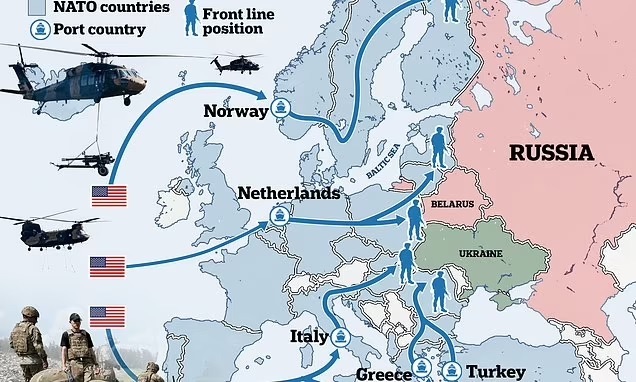
“It is clear that huge logistics bases, as we know it from Afghanistan and Iraq, are no longer possible because they will be attacked and destroyed very early on in a conflict situation,” Lieutenant General Alexander Sollfrank, head of NATO’s JSEC logistics command, told the newspaper. The primary route for American troops in the event of war with Russia would be via the Dutch port of Rotterdam to Germany and Poland, the report said. Alternative corridors would start in Italy, Greece, and Türkiye, and would respectively run through Slovenia and Croatia to Hungary and through Bulgaria and Romania. There are also plans to involve Norway, Sweden, and Finland for backup logistics.
The US and its allies have claimed that Moscow could attack NATO, and that sending arms to Ukraine to fight Russia will help stall or prevent that outcome. Moscow has denied having any such intentions, and has accused Western governments of creating false threats to deceive their populations over the Ukraine conflict. Russian officials have described the hostilities with Ukraine as a US-initiated proxy war aimed at undermining Russian development, in which Ukrainian soldiers serve as “cannon fodder” while weapons, intelligence, training, and planning is contributed by the West. A direct conflict with NATO would be an existential threat to Russia, according to Moscow, considering the bloc’s superiority in conventional forces. Consequently, any such clash would warrant the deployment of nuclear weapons under Russian nuclear doctrine, it has warned.

“If we go all the way with this mechanism, it must work. If it doesn’t work, we have to reform it. That’s the future of the European Union.”
• Punish Hungary To Ensure EU’s Future – Bloc Presidency Holder Belgium (RT)
The EU should strip Hungary of its voting rights to safeguard the union’s future, Belgian Foreign Minister Hadja Lahbib has argued. Budapest is scheduled to take over the EU Council’s rotating presidency in July. Belgium, the current holder, is in a group of countries voicing frustration over Hungary’s opposition to key EU plans – including support for Ukraine in the conflict with Russia. “I think we need to have the courage to make decisions: go right to the end of Article 7, activate Article 7 right to the end, which provides for the end of the right of veto,” the Belgian diplomat told Politico on Sunday. Article 7, which involves a suspension of voting rights, is often referred to as a “nuclear option” against member states considered to have breached the EU’s values.
The European Parliament voted to launch the procedure against Hungary in 2018, accusing Prime Minister Viktor Orban’s government of undermining the rule of law through alleged attacks on the media and judiciary – but the process stalled due to disagreements between member states. Orban is a vocal critic of the Western stance on the Ukraine crisis. He has argued that the arming of Kiev against Moscow has failed to stop the hostilities, and that sanctions have inflicted more harm on the EU than on Russia. Budapest has repeatedly used its veto power to block trade restrictions on Russia that it views as a threat to Hungarian interests, and to restrict funding for Ukraine. Lahbib accused the Orban government of “increasingly adopting a transactional, blocking and veto attitude” to the bloc’s affairs.
“This is a moment of truth,” she said of the Article 7 threat. “If we go all the way with this mechanism, it must work. If it doesn’t work, we have to reform it. That’s the future of the European Union.” Hungary is the only EU member currently facing such proceedings. In May, Brussels dropped a similar inquiry into Poland’s domestic policies. Warsaw aligns with Brussels on Ukraine, but until recently had a conservative government that opposed it on other matters, including refugees and LGBT rights. This changed last December, when Donald Tusk – a longtime EU supporter and former president of the European Council – returned to office as Polish prime minister. “You can do anything as long as you’re one of them, as long you’re part of the Brussels mainstream,” Polish MEP Radoslaw Fogiel said at the time, in an interview with the news outlet Hungarian Conservative.

The man that Belgium thinks should be punished:
“We must not forget that the war is waged by people, and these very people, if they are willing, have every opportunity to make peace..”
• Orban Believes Trump, EU Could End Ukrainian Conflict In 24 Hours (TASS)
Donald Trump, the potential Republican candidate in the US presidential election, and the European Union could put an end to the conflict in Ukraine in 24 hours, Hungarian Prime Minister Viktor Orban said. “If Trump and the EU wanted to end the war [in Ukraine], they could have done it in 24 hours. We must not forget that the war is waged by people, and these very people, if they are willing, have every opportunity to make peace. I think that if Trump became president, he could achieve a ceasefire in Ukraine in one day, and then start talks,” the prime minister told the Il Giornale newspaper. According to him, the EU strategy on the Ukrainian issue has failed even from a tactical point of view. “We don’t understand that we are playing with fire. We should ask ourselves what are Europe’s strategic interests and demand a ceasefire. Our citizens want peace, not war, which could be a political game,” Orban added.
The prime minister said that he expects a new right-wing majority in the European Parliament after the elections scheduled for June 8-9. “The current European Commission has failed on the agricultural issue, on the conflicts, on the migration issue, on the economy, and now its leadership must go. Strengthening democracy means electing a new commission, different from the current one, which was the worst in my memory,” Orban said. At the same time, he hinted that much depended on the decision of his Italian counterpart Giorgia Meloni, the leader of the European conservatives, and Marine Le Pen, the leader of the French National Rally party’s parliamentary group. “The right-wing parties must cooperate, we are in the hands of two women who must come to an agreement,” the Hungarian prime minister concluded.

“..you need to return to being reporters and not advocates; you need to start reaching an audience larger than yourself and your friends.”
• People are Not Reading Your Stuff: Publisher Drops Truth Bomb at WaPo (Turley)
Washington Post publisher and CEO William Lewis is being denounced this week after the end of the short-lived tenure of Executive Editor Sally Buzbee and delivering a truth bomb to the staff. Lewis told them that they have lost their audience and “people are not reading your stuff.” It was a shot of reality in the echo chambered news outlet and the response was predictable. However, Lewis just might save this venerable newspaper if he follows his frank talk with meaningful reforms to bring balance back to the Post. As someone who once wrote for the Washington Post regularly, I have long lamented the decline of the paper following a pronounced shift toward partisan and advocacy journalism. There was a time when the Post valued diversity of thought and steadfastly demanded staff write not as advocates but reporters. That began to change rapidly in the first Trump term.
Suddenly, I found editors would slow walk copy, contest every line of your column, and make unfounded claims. In the meantime, they were increasingly running unsupported legal columns and even false statements from authors on the left. When confronted about columnists with demonstrably false statements, the Post simply shrugged. One of the most striking examples was after its columnist Philip Bump had a meltdown in an interview when confronted over past false claims. After I wrote a column about the litany of such false claims, the Post surprised many of us by issuing a statement that they stood by all of Bump’s reporting, including false columns on the Lafayette Park protests, Hunter Biden laptop and other stories. That was long after other media debunked the claims, but the Post stood by the false reporting.
The decline of the Post has followed a familiar pattern. The editors and reporters simply wrote off half of their audience and became a publication for largely liberal and Democratic readers. In these difficult economic times with limited revenue sources, it is a lethal decision. Yet, for editors and reporters, it is still professionally beneficial to embrace advocacy journalism even if it is reducing the readership of your own newspaper. Lewis, a British media executive who joined the Post earlier this year, reportedly got into a “heated exchange” with a staffer. Lewis explained that, while reporters were protesting measures to expand readership, the very survival of the paper was now at stake: “We are going to turn this thing around, but let’s not sugarcoat it. It needs turning around,” Lewis said. “We are losing large amounts of money. Your audience has halved in recent years. People are not reading your stuff. Right. I can’t sugarcoat it anymore.” Other staffers could not get beyond the gender and race of those who would be overseeing them. One staffer complained “we now have four White men running three newsrooms.”
The Post has been buying out staff to avoid mass layoffs, but reporters are up in arms over the effort to turn the newspaper around. The question is whether, after years of creating a culture of advocacy journalism and woke reporting, the Post is still capable of reaching a larger audience. If you want to read about certain stories, you are not likely to go to the Post, NPR or other outlets. Likewise, with reporters referring to the January 6th riot as an “insurrection,” there is little doubt for the reader that the coverage is a form of advocacy. Again, such stories can affirm the bona fides for reporters, but they also affirm the bias for readers. I truly do hope that the Washington Post can recover. The newspaper has played a critical role in our history and a towering example of journalism at its very best from the Pentagon Papers to Watergate. If you want people to “read your stuff,” you need to return to being reporters and not advocates; you need to start reaching an audience larger than yourself and your friends.

“Americans should pray it never actually has to defend the United States..”
• The Military-Industrial Complex Is Killing Us All (Vine/Arriola)
The Emergence of a Monster: To face what it would take to dismantle the MIC, it’s first necessary to understand how it was born and what it looks like today. Given its startling size and intricacy, we and a team of colleagues created a series of graphics to help visualize the MIC and the harm it inflicts, which we’re sharing publicly for the first time.
The MIC was born after World War II from, as Eisenhower explained, the “conjunction of an immense military establishment” — the Pentagon, the armed forces, intelligence agencies, and others — “and a large arms industry.” Those two forces, the military and the industrial, united with Congress to form an unholy “Iron Triangle” or what some scholars believe Eisenhower initially and more accurately called the military-industrial–congressional complex. To this day those three have remained the heart of the MIC, locked in a self-perpetuating cycle of legalized corruption (that also features all too many illegalities). The basic system works like this: First, Congress takes exorbitant sums of money from us taxpayers every year and gives it to the Pentagon. Second, the Pentagon, at Congress’s direction, turns huge chunks of that money over to weapons makers and other corporations via all too lucrative contracts, gifting them tens of billions of dollars in profits. Third, those contractors then use a portion of the profits to lobby Congress for yet more Pentagon contracts, which Congress is generally thrilled to provide, perpetuating a seemingly endless cycle.

But the MIC is more complicated and insidious than that. In what’s effectively a system of legalized bribery, campaign donations regularly help boost Pentagon budgets and ensure the awarding of yet more lucrative contracts, often benefiting a small number of contractors in a congressional district or state. Such contractors make their case with the help of a virtual army of more than 900 Washington-based lobbyists. Many of them are former Pentagon officials, or former members of Congress or congressional staffers, hired through a “revolving door” that takes advantage of their ability to lobby former colleagues. Such contractors also donate to think tanks and university centers willing to support increased Pentagon spending, weapons programs, and a hyper-militarized foreign policy. Ads are another way to push weapons programs on elected officials.
Such weapons makers also spread their manufacturing among as many Congressional districts as possible, allowing senators and representatives to claim credit for jobs created. MIC jobs, in turn, often create cycles of dependency in low-income communities that have few other economic drivers, effectively buying the support of locals. For their part, contractors regularly engage in legalized price gouging, overcharging taxpayers for all manner of weapons and equipment. In other cases, contractor fraud literally steals taxpayer money. The Pentagon is the only government agency that has never passed an audit — meaning it literally can’t keep track of its money and assets — yet it still receives more from Congress than every other government agency combined.

As a system, the MIC ensures that Pentagon spending and military policy are driven by contractors’ search for ever-higher profits and the reelection desires of members of Congress, not by any assessment of how to best defend the country. The resulting military is unsurprisingly shoddy, especially given the money spent. Americans should pray it never actually has to defend the United States. No other industry — not even Big Pharma or Big Oil — can match the power of the MIC in shaping national policy and dominating spending. Military spending is, in fact, now larger (adjusting for inflation) than at the height of the wars in Vietnam, Afghanistan, or Iraq, or, in fact, at any time since World War II, despite the absence of a threat remotely justifying such spending. Many now realize that the primary beneficiary of more than 22 years of endless U.S. wars in this century has been the industrial part of the MIC, which has made hundreds of billions of dollars since 2001. “Who Won in Afghanistan? Private Contractors” was the Wall Street Journal‘s all too apt headline in 2021.

Musk: on X: “Laura “Liar” Kolodny”.
The move makes a lot of sense.
• Musk Corrects “Liar” CNBC Journo Over Nvidia Report (ZH)
Another day, another Tesla report to take with a big grain of salt until further notice. In the latest report from CNBC, citing “emails written by Nvidia senior staff” and “correspondence from Nvidia staffers” that “Musk presented an exaggerated picture of Tesla’s procurement” of Nvidia’s flagship artificial intelligence chip, the H100, diverting “a sizable shipment of AI processors” from Tesla to X and xAI. Update: Further notice has occurred… the salt was wise. In a Tuesday morning post on X, Musk said: “Tesla had no place to send the Nvidia chips to turn them on, so they would have just sat in a warehouse,” adding “The south extension of Giga Texas is almost complete. This will house 50k H100s for FSD training.” According to Musk, “Of the roughly $10B in AI-related expenditures I said Tesla would make this year, about half is internal, primarily the Tesla-designed AI inference computer and sensors present in all of our cars, plus Dojo,” adding that Nvidia hardware “is about 2/3 of the cost.”
Musk estimated that Tesla purchases of Nvidia hardware will be “$3B to $4B this year.” As CNBC continues; By ordering Nvidia to let privately held X jump the line ahead of Tesla, Musk pushed back the automaker’s receipt of more than $500 million in graphics processing units, or GPUs, by months, likely adding to delays in setting up the supercomputers Tesla says it needs to develop autonomous vehicles and humanoid robots. “Elon prioritizing X H100 GPU cluster deployment at X versus Tesla by redirecting 12k of shipped H100 GPUs originally slated for Tesla to X instead,” an Nvidia memo from December said. “In exchange, original X orders of 12k H100 slated for Jan and June to be redirected to Tesla.”
A more recent Nvidia email, from late April, said Musk’s comment on the first-quarter Tesla call “conflicts with bookings” and that his April post on X about $10 billion in AI spending also “conflicts with bookings and FY 2025 forecasts.” The email referenced news about Tesla’s ongoing, drastic layoffs and warned that headcount reductions could cause further delays with an “H100 project” at Tesla’s Texas Gigafactory. The new information from the emails, read by CNBC, highlights an escalating conflict between Musk and some agitated Tesla shareholders who question whether the billionaire CEO is fulfilling his obligations to Tesla while also running a collection of other companies that require his attention, resources and hefty amounts of capital. Really? Does it highlight the escalating conflict?

But he will remain in jail because of all the other indictments.
• Pakistan Overturns Imran Khan’s Treason Conviction (RT)
The Islamabad High Court on Monday vacated the former Prime Minister Imran Khan’s conviction for leaking state secrets. He remains behind bars, however, for allegedly violating Islamic tradition with his marriage. Khan, 71, was ousted in April 2022. Since then, he has faced over 100 indictments, which his party has denounced as politically motivated. The state secrets case saw him sentenced to ten years in prison in February, just ahead of the national elections. “Thank God, the sentence is overturned,” Naeem Panjutha, a spokesman for Khan’s Pakistan Tehreek-e-Insaf (PTI) party, said after the court announced its decision. Former foreign minister Shah Mehmood Qureshi (2018-2022) was also acquitted of the charges. Khan has cited a classified cable as proof that the Pakistani military conspired with the US to overthrow his government after he visited Russia. The US has denied the accusation.
The government in Islamabad has claimed that by revealing the contents of the cable, Khan violated the state secrets law. “It is a fact that a national security document was used for political purposes,” government spokesman for legal issues Aqeel Malik said at a press conference on Monday, noting that PM Shehbaz Sharif’s government might appeal Khan’s acquittal to the Supreme Court. Two other convictions against Khan, handed out just days before the February 8 vote, have been stayed pending appeal. In one case, he and his wife Bushra were sentenced to 14 years for illegally selling state gifts. Khan remains in prison because of the seven-year conviction for allegedly violating Islamic tradition by marrying Bushra too soon after her divorce. According to his party, the case has no leg to stand on, as Bushra herself had the sole right to decide on the timing of the marriage.
Multiple convictions have been used to bar Khan and PTI from running for office in the February election. The party’s candidates still got 93 out of the 266 directly elected seats in the legislature, but were kept from power by a coalition of the Pakistan Muslim League-Nawaz (PML-N) and the Pakistan People’s Party (PPP), which won 54 and 73 seats, respectively. While Monday’s acquittal is a “huge political and legal victory” for Khan, the cricket-star-turned-politician won’t be released any time soon, journalist and political analyst Mazhar Abbas told Reuters.


From Jim Kunstler’s site. Obviously, we have the same issues. Credit card expiration is a point that warrants attention. Our Patreon revenue is down 25%. So is Paypal.
“Note to Readers: We’ve just come through the time of year when credit cards expire. My Patreon revenue is down and I doubt it is because you’re disappointed in this blog’s content. Plus, it comes to you absolutely reliably twice-a-week, without fail. You can continue reading it for free — there’s no pay-wall — but just know that I depend on this support to make a living. Back in the day, a newspaper would pay me a salary, but this is no longer that day and now public voices like mine must perform like buskers on the street. Acknowledging that times are tough and getting tougher, if you are a regular reader here, please consider kicking in maybe two bucks a month for the eight blog-columns you’ll get and probably appreciate, just as I will be grateful to get paid for the work I do putting them out there. Just sayin’. . . .”




David Sacks explains exactly how Dr. Anthony Fauci orchestrated the pandemic and knowingly lied to the American public to protect his own a**.
If there is one thing you watch today, this is it.
During the @theallinpod, Sacks explains how Fauci purposely misled the American… pic.twitter.com/puLlfoLL17
— Collin Rugg (@CollinRugg) June 4, 2024

Tucker Carlson on Meeting Klaus Schwab & What Motivates the Ruling Class
"He's like an elderly idiot who seems a little senile, doesn't have any idea what he's talking about…The closer you get, the more you realize the people running things are mediocre. Like buffoons."… pic.twitter.com/2jvQ7nKEei
— Chief Nerd (@TheChiefNerd) June 4, 2024

Orca
https://twitter.com/i/status/1797838232970834430

Hug
https://twitter.com/i/status/1798046998677115057

Excavator
The way this woman repaired an excavator
— Science girl (@gunsnrosesgirl3) June 4, 2024

Owl head
https://twitter.com/i/status/1797883246233231396

Mom
https://twitter.com/i/status/1797738846701969634

Pick up
https://twitter.com/i/status/1797671289047703651

Dog toys
https://twitter.com/i/status/1797975287755641010


Support the Automatic Earth in wartime with Paypal, Bitcoin and Patreon.














